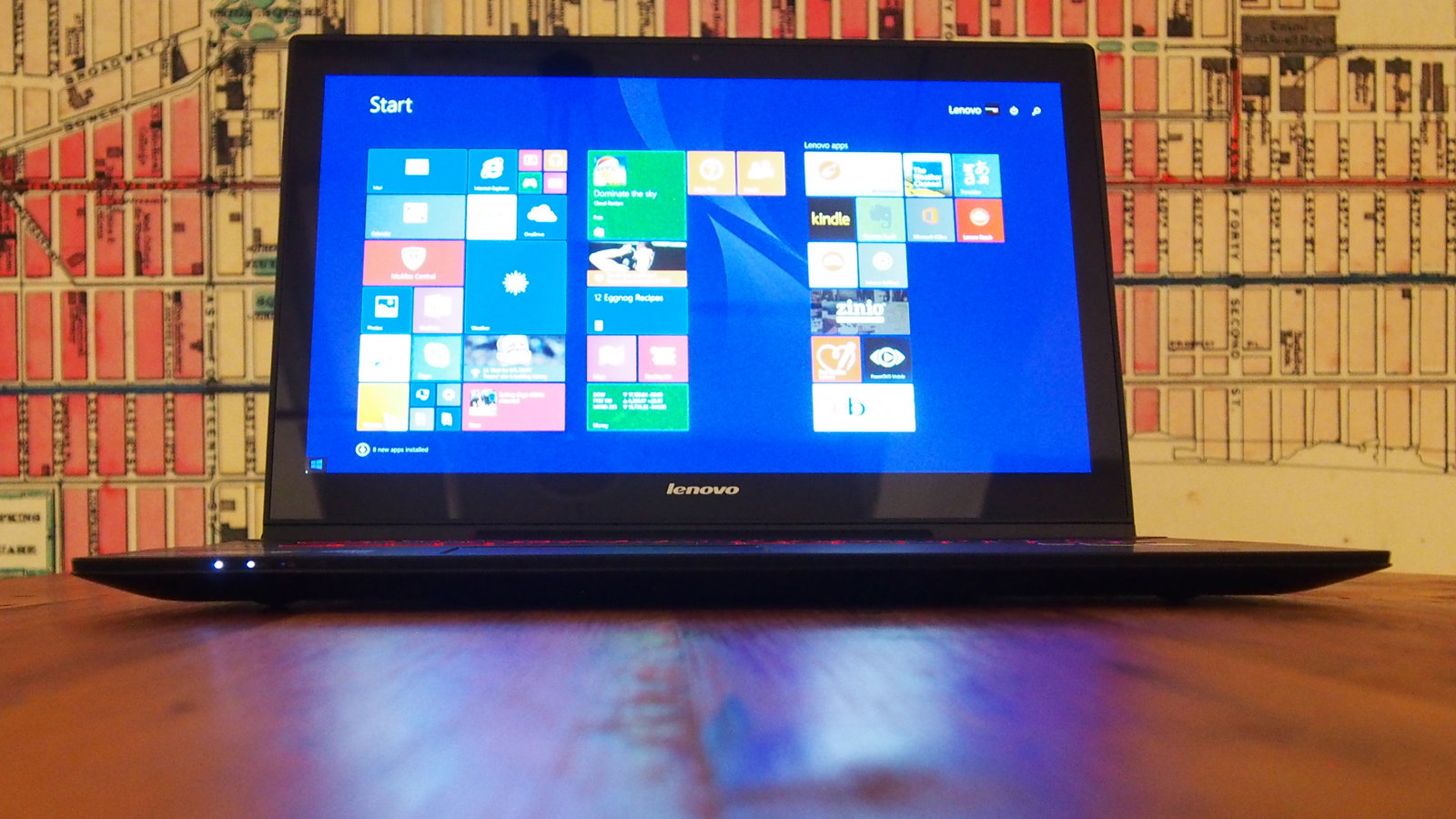Why you can trust TechRadar
The Lenovo Y70 Touch measures 17.3 inches diagonally, an undeniably large chassis size on your lap or your desk. Let's see whether Lenovo stuffed impressive hardware inside to justify the size.
Here's what's inside the $1,399 Y70 Touch configuration sent to TechRadar for review:
Spec list
- CPU: 2.5GHz Intel Core i7-4710HQ (quad-core, 6MB cache)
- Graphics: Nvidia GeForce GTX 860M (4GB GDDR5 RAM)
- RAM: 16GB DDR3L
- Screen: 17.3-inch, 1,920 x 1,080 FHD multi-touch screen
- Storage: Hybrid 1TB (5400 RPM) plus 8GB SSD
- Ports: 2 USB 3.0, 1 USB 2.0, combo mic/headphone jack, HDMI-out, 4-in-1 card reader, Ethernet, SPDIF
- Connectivity: Intel Dual Band Wireless-AC 3160, Bluetooth 4.0
- Camera: 720p HD webcam
- Weight: 7.5 pounds
- Size: 16.64 x 11.44 x 1.02 inches
At the time of writing, the Y70 Touch is offered in 3 configurations starting at $1,199 (£1,199, about AU$1,458) and making its way up to $1,499. Tier by tier, the upgrade options are minimal, offering boosts in the way of GPU performance, RAM and storage.
The $1,399 configuration provides the best value. That's especially so when you consider that, with this option, the extra $200 investment doubles the GPU and RAM carry-load. But what if you dig the design, but you're not especially sold on 17.3-inches? It's possible to get this exact configuration one step down with Lenovo's smaller, 15-inch Y50 for $1,099 (about £890, AU$1353).
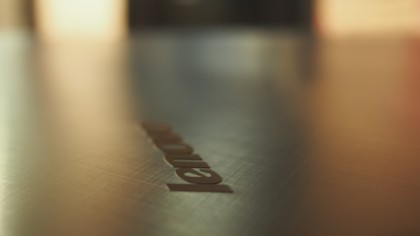
Comparing the price configurations of the Y70 to other gaming laptops isn't too useful. If you're looking at this review, value is obviously as big of a concern as performance is. The MSI GT72 Dominator Pro starts at nearly $2,300 (about £1,863, AU$2,832) and the Origin EON17-S configurations bottom out at just below $1,900 (about £1,539, AU$2,334). With the Y70 Touch, what Lenovo offers for $1,199 isn't necessarily a steal, but you are getting a 17.3-inch gaming laptop with decent specs at a more digestible price.
Performance
If you, like me, are hoarding a huge backlog of games to play through on Steam, the Y70 will likely be able to plow through most of them on medium to high graphics setting, depending on their intensity, of course.
Just Cause 2, for example, was a blast at 60+ frames per second (fps) on very high, with only a few of the more intensive settings, like GPU water simulation checked off. But with Middle-earth: Shadow of Mordor, I encountered some slow down on medium settings. I'm not entirely surprised, but the results are telling.
Frankly, I definitely wouldn't consider this machine if your focus is exclusively on playing the games of 2015. Here's how the Y70 Touch performed under a few of our synthetic benchmark tests:
Benchmarks
- 3DMark: Ice Storm: 85,342; Cloud Gate: 13,981; Fire Strike: 3,710
- Cinebench CPU: 497 points; Graphics: 90 fps
- PCMark 8 Home: 2,491 points
- PCMark 8 Battery Life: 1 hours, 48 minutes
- BioShock Infinite (1080p, Ultra): 43 fps; (1080p, Low): 135 fps
- Metro: Last Light (1080p, Ultra): 16 fps; (1080p, Low): 75 fps
With a bit of a graphical tuning, I found that the Y70 Touch can handle the modern classics of yesterday at full resolution quite well. Better yet, it does so while keeping fan volume at a pleasingly quiet hum. This is an issue with a lot of gaming laptops. They look like a slick charm, but sound like a plane taking off.
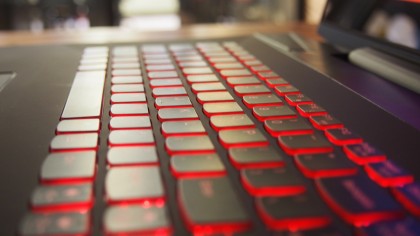
But again, interfacing with the Y70 Touch – especially in games – fluctuates between dreamy and nightmarish. The perfect example of this is how the near-perfect keyboard is muddled by its forced abundance of keys, making it hard to discern crucial ones like "Enter" and "Backspace" without looking down, taking myself out of the action.
A monstrous movie machine and multitasker
While the laptop's massive size was certainly something to get used to, I eventually warmed up to it. Its proficiency at handling a host of tasks within Windows 8 helped make it feel close to a desktop experience. The 17.3-inch FHD screen is bright, crisp and the colors are mostly faithful in their reproduction.
When it came to handling spinning plates, so to speak, the Y70 did just fine. A Google Chrome browser with close to 20 tabs displaying GIFs, two of which were used for streaming high-definition video and audio, ran flawlessly. I beamed a few gameplay sessions and movies over HDMI to my TV at 1080p, and the experience was also seamless.
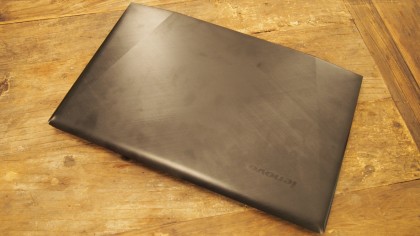
Also, in its smaller siblings, the Lenovo Y40 and Y50, the twin JBL speakers rock the house. They're by no means a replacement for a full home theater solution, but you'll be impressed with their room-filling capability. Games, movies and music all sounded decent. Consider it a compliment that I never immediately reached for headphones while listening to something.
Super-sized, but short lived
One of our benchmarks, PCMark 8 Battery Life, measures how a laptop battery holds up under the weight of an assortment of relatively basic tasks, like video chats, web browsing and editing photos, to name a few. After the test, it concluded that the battery would last 1 hour and 48 minutes. Lenovo claims 5 hours of battery life, so what's going on here?
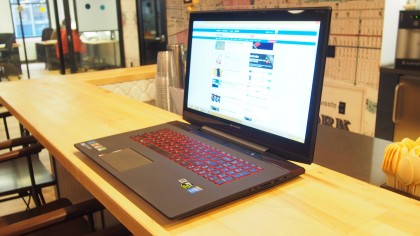
To make sure the test wasn't fibbing, I drained the battery down myself. The approximation was close, but I squeezed a few more minutes out of it on the "Balanced" power setting, shutting down after 2 hours and 3 minutes. This sounds horrible, but a 17.3-inch screen requires serious power. It's best to stay near an electrical source for this one, especially if you're gaming. Lenovo's advertised battery life could likely be achieved without activity of any kind.
Bundled software
Most of the software that Lenovo included can be tossed without a second thought – like McAfee Internet Security, Zinio and Amazon Kindle – though some of it may be of interest. Here are the highlights:
- VeriFace Pro: This app uses the integrated webcam for face identification in lieu of typing in a password.
- Microsoft Office 365 Home Premium (30-day trial): A free 30 days of Office 365 – use it while it lasts.
- Evernote: The popular note taking and sharing app comes preloaded on almost all Lenovo PCs, this one included.
Cameron is a writer at The Verge, focused on reviews, deals coverage, and news. He wrote for magazines and websites such as The Verge, TechRadar, Practical Photoshop, Polygon, Eater and Al Bawaba.
